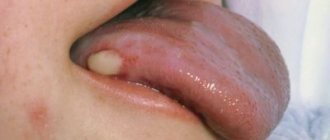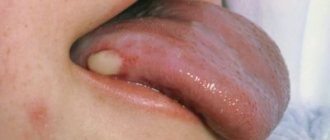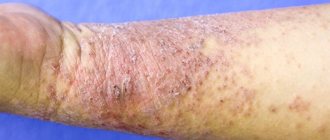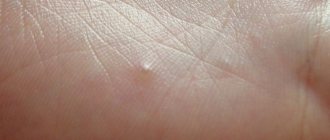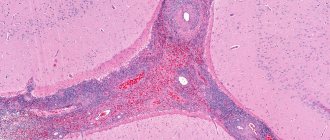Diet for eczema: facts
Practice shows that people suffering from eczema, to prevent exacerbations of symptoms, often adhere to all kinds of diets found in medical books and on the Internet. (Practice shows that people who suffer from eczema do their best to get rid of irritation and itching of the skin. In this regard, they often adhere to all kinds of diets found in medical books and on the Internet.)
How effective are these diets? Research results on this issue are mixed.
This article provides expert advice on choosing a diet for eczema.
General rules
Eczema belongs to a group of dermatoses with a chronic relapsing course, manifested by a characteristic serous reaction of inflammation of the epidermis and dermis of the skin (in the form of grouped small blisters), itching and pronounced weeping. The disease is based on increased sensitivity of the skin to exogenous/endogenous irritants with the development of sensitization of the body to physical, chemical, infectious, food antigens, which determines the variety of forms of eczema. The disease usually occurs against the background of secondary immunodeficiency , genetic predisposition, infectious-allergic processes, nervous system dysfunction, and gastrointestinal diseases.
Diet plays a significant role in the treatment of patients (regardless of the form of eczema). For eczema in adults, it is recommended to prescribe a nutritious diet with a sharp limitation of simple carbohydrates and sodium chloride. The diet must contain the physiological norm of proteins, which is achieved by including products containing complete protein (low-fat red meat, white fish, poultry, dairy products, cottage cheese). Sufficient fortification of the diet is of great importance. To do this, you should include a sufficient amount of vegetables and fruits, as well as foods rich in fiber, which help remove toxic metabolic products from the body and normalize intestinal function (whole grains, bran, almonds, lentils, fruit peels, peanuts, raisins).
The diet for eczema on the hands and feet should include foods containing antioxidants ( vitamins A , C , E ), which reduce the risk of new skin lesions. Vitamin C is rich in leafy green salads, black currants, citrus fruits, rose hips, broccoli, strawberries, melon, Brussels sprouts, strawberries, apples, bell peppers, kiwi, sea buckthorn, tomatoes. However, you should not exceed its daily dose (100 mg), since it stimulates the growth of connective tissue. It must be taken into account that heat treatment of products reduces its content in products by up to 50%.
It is important for eczema on the hands and feet to include in the diet foods rich in vitamin A and beta-carotene , which improve skin condition and strengthen the immune system - fish oil, spinach, pumpkin, green peas, carrots, broccoli, plums, chicken egg yolks, liver . The diet should also contain foods rich in B vitamins that help normalize metabolism and improve digestion - pork, beef, peanuts, buckwheat, brown rice, millet, pine nuts, almonds, pumpkin seeds, oatmeal and barley, fish, corn, liver , eggs. The diet should include 1.2-1.5 liters of free liquid in the form of juices, still mineral water, compotes and various types of tea.
The diet of a patient with eczema is limited to foods and dishes containing easily digestible carbohydrates: sugar, jam, confectionery, honey, sweets, cakes. Sugar can be replaced with aspartame , xylitol , saccharin . It is not allowed to include strong meat, fish and mushroom broths, fried and spicy foods, canned food, pickled and pickled vegetables, animal fats, smoked meats, coffee, carbonated and alcohol-containing drinks in the diet.
For eczema that occurs with a pronounced allergic component, the patient is prescribed a general hypoallergenic diet. The diet excludes all foods with a high potential for allergenic activity and a pronounced sensitizing effect, as well as foods that irritate the gastrointestinal mucosa. Potentially allergenic products include chicken eggs, milk, fish and seafood, caviar, goose and duck meat, herring, legumes, oysters, mushrooms, yeast, honey, citrus fruits, spinach, various nuts, legumes, melon, tomatoes, raspberries, peaches, cocoa , strawberries, chocolate vegetables and fruits of red-orange color. These foods should be excluded from the diet during periods of exacerbation of eczema. It is also important to limit easily digestible carbohydrates (honey, sugar syrups, jam, preserves), which can exacerbate the inflammatory process. Fatty pork/beef varieties, wheat bread, sour cream, whole milk, and semolina are subject to restrictions.
Particular attention in the diet should be paid to products that contain large quantities of histamine and tyramine , which are actively involved in the development of allergic reactions. These substances are contained in products manufactured using technologies with fermentation processes (sauerkraut, hard cheese, raw smoked sausage, canned fish, sausages and sausages). Products that accelerate the absorption of allergens are also subject to restrictions: carbonated, sweet and alcohol-containing drinks, coffee, herbs and spices, salted fish and vegetables. The diet for hand eczema involves strictly limiting foods that contain artificial food additives (flavors, antioxidants, preservatives, dyes).
In the acute period of the disease, the patient is recommended to be on a dairy-vegetable diet (cottage cheese, fermented milk products, permitted vegetables and fruits) for 7-10 days, and then, as the clinical symptoms subside, gradually expand the diet. When hand eczema is combined with intestinal dysbiosis be sure to include prebiotics , and in more severe cases, probiotics ( Lactofit forte , Lactobacterin , Biosporin , Linex , Bifiform ), which effectively restore the natural intestinal biocenosis. Among the methods of culinary processing in order to protect the gastrointestinal mucosa from chemical exposure, it is recommended to use baking or boiling products; frying is not allowed. Food intake is fractional, in small portions. When planning your diet and preparing meals, you must follow a number of rules:
- The consumption of raw vegetables and fruits should be minimized, giving preference to products that have undergone heat treatment, which significantly reduces the allergic activity of the products.
- Drain the first water after boiling when preparing broths, porridges, vegetable purees and soups.
- Soak the potatoes in cold water for several hours to reduce the starch content.
What can you eat if you have eczema?
Allowed food is divided into two types: products with some allergen content and products without allergens. The first type is allowed to be eaten in limited quantities.
For eczema, the diet is hypoallergenic, that is, dyes, preservatives and other additives in food are prohibited.
Patients with eczema should consume:
- Lean meats, such as rabbit, turkey, horse meat, lamb, and duck.
- Lean fish.
- All cereals.
- Beans.
- Fruits and vegetables, except products with red pigment.
- Fermented milk products. It is better to replace store-bought products with homemade ones. For example, you can replace mayonnaise with sour cream, and make your own yogurt.
- Instead of pastry and bread, you should eat breads without yeast in the composition.
- Berries and legumes.
Authorized Products
The diet for eczema includes soups prepared in a weak broth without frying with the addition of garden herbs. Second courses are prepared from lean boiled (baked) or stewed dietary meat of rabbit, turkey or chicken. For a side dish, you can use potatoes (pre-soaked in water) and boiled in water in various forms (individual pieces, mashed potatoes).
Among cereals, preference is given to oatmeal, buckwheat and wheat porridge. It is allowed to include whole grain bread, durum wheat pasta, and dry biscuits in the diet. Dairy products - yogurt without fruit additives, low-fat fermented milk products, low-fat fresh cottage cheese.
Vegetables (lettuce, cucumber, onion, zucchini, cabbage) must be served boiled or stewed. Fats in the diet include sunflower or olive vegetable oil. Recommended drinks include juices from permitted vegetables and fruits, green tea, still mineral water, and rose hip decoction.
Table of permitted products
| Proteins, g | Fats, g | Carbohydrates, g | Calories, kcal | |
Vegetables and greens | ||||
| eggplant | 1,2 | 0,1 | 4,5 | 24 |
| zucchini | 0,6 | 0,3 | 4,6 | 24 |
| broccoli | 3,0 | 0,4 | 5,2 | 28 |
| Brussels sprouts | 4,8 | 0,0 | 8,0 | 43 |
| cauliflower | 2,5 | 0,3 | 5,4 | 30 |
| green onion | 1,3 | 0,0 | 4,6 | 19 |
| bulb onions | 1,4 | 0,0 | 10,4 | 41 |
| squash | 0,6 | 0,1 | 4,3 | 19 |
| parsley | 3,7 | 0,4 | 7,6 | 47 |
| salad | 1,2 | 0,3 | 1,3 | 12 |
| celery | 0,9 | 0,1 | 2,1 | 12 |
| soybeans | 34,9 | 17,3 | 17,3 | 381 |
| asparagus | 1,9 | 0,1 | 3,1 | 20 |
| Jerusalem artichoke | 2,1 | 0,1 | 12,8 | 61 |
| dill | 2,5 | 0,5 | 6,3 | 38 |
| beans | 7,8 | 0,5 | 21,5 | 123 |
| garlic | 6,5 | 0,5 | 29,9 | 143 |
| lentils | 24,0 | 1,5 | 42,7 | 284 |
Fruits | ||||
| pears | 0,4 | 0,3 | 10,9 | 42 |
| nectarine | 0,9 | 0,2 | 11,8 | 48 |
| peaches | 0,9 | 0,1 | 11,3 | 46 |
| apples | 0,4 | 0,4 | 9,8 | 47 |
Berries | ||||
| gooseberry | 0,7 | 0,2 | 12,0 | 43 |
| black currant | 1,0 | 0,4 | 7,3 | 44 |
Nuts and dried fruits | ||||
| flax seeds | 18,3 | 42,2 | 28,9 | 534 |
| sunflower seeds | 20,7 | 52,9 | 3,4 | 578 |
Cereals and porridges | ||||
| buckwheat (kernel) | 12,6 | 3,3 | 62,1 | 313 |
| oat groats | 12,3 | 6,1 | 59,5 | 342 |
| cereals | 11,9 | 7,2 | 69,3 | 366 |
| wheat bran | 15,1 | 3,8 | 53,6 | 296 |
Dairy | ||||
| dairy products | 3,2 | 6,5 | 4,1 | 117 |
| kefir 1% | 2,8 | 1,0 | 4,0 | 40 |
Cheeses and cottage cheese | ||||
| cottage cheese 0.6% (low fat) | 18,0 | 0,6 | 1,8 | 88 |
| curd tofu | 8,1 | 4,2 | 0,6 | 73 |
Meat products | ||||
| boiled beef | 25,8 | 16,8 | 0,0 | 254 |
| beef stew | 16,8 | 18,3 | 0,0 | 232 |
Bird | ||||
| steamed chicken breast | 23,6 | 1,9 | 0,0 | 113 |
| boiled turkey fillet | 25,0 | 1,0 | — | 130 |
Fish and seafood | ||||
| seaweed | 0,8 | 5,1 | 0,0 | 49 |
Oils and fats | ||||
| butter | 0,5 | 82,5 | 0,8 | 748 |
| linseed oil | 0,0 | 99,8 | 0,0 | 898 |
| olive oil | 0,0 | 99,8 | 0,0 | 898 |
| sunflower oil | 0,0 | 99,9 | 0,0 | 899 |
Non-alcoholic drinks | ||||
| mineral water | 0,0 | 0,0 | 0,0 | — |
| instant chicory | 0,1 | 0,0 | 2,8 | 11 |
| green tea | 0,0 | 0,0 | 0,0 | — |
Juices and compotes | ||||
| rose hip juice | 0,1 | 0,0 | 17,6 | 70 |
| * data is per 100 g of product | ||||
Prevention of eczema
With eczema, prevention is very important. It is possible to cure the disease to the chronic stage.
- The main rule is to maintain hygiene. Cleanliness of the skin, its condition, hydration and nutrition will provide protection against various pathologies.
- Do not contact with water in case of relapse in the patient.
- Follow the rules of nutrition. Eliminate all allergens from the composition, and ask your doctor what exactly to eat if you have eczema.
- Do not drink alcohol or smoke.
- Follow your doctor's recommendations.
- Do not contact with chemicals or household products.
- Wear quality clothes and use good cosmetics.
- Consult a dermatologist regularly.
Fully or partially limited products
A diet for eczema involves excluding from the diet strong meat and fish broths, fatty red meats, smoked meats, chicken eggs, most sausages, seafood (mussels, shrimp, squid), canned food, pickled vegetables and any salty foods, cooking and animal fats, sour cream, cream, salty and fatty cheeses, cottage cheese. Products containing easily digestible carbohydrates - jam, honey, sugar, ice cream, confectionery, jams, sweets - are excluded.
White rice, semolina, soybeans, and pasta are subject to restrictions. Any seasonings (mustard, mayonnaise, horseradish, ketchup), mushrooms, vinegar, eggplant, pineapple, butter dough, melon, as well as red and orange fruits/vegetables (citrus fruits, carrots, beets, radishes, tomatoes, strawberries) are excluded from the diet , red apples, strawberries, radishes), various nuts, coffee. It is not allowed to include in the diet products containing food additives, fruit tea, sweet carbonated and alcohol-containing drinks, juices from prohibited fruits, vegetables and berries.
Table of prohibited products
| Proteins, g | Fats, g | Carbohydrates, g | Calories, kcal | |
Vegetables and greens | ||||
| carrot | 1,3 | 0,1 | 6,9 | 32 |
| salad pepper | 1,3 | 0,0 | 5,3 | 27 |
| tomatoes | 0,6 | 0,2 | 4,2 | 20 |
Fruits | ||||
| oranges | 0,9 | 0,2 | 8,1 | 36 |
| bananas | 1,5 | 0,2 | 21,8 | 95 |
| pomegranate | 0,9 | 0,0 | 13,9 | 52 |
| grapefruit | 0,7 | 0,2 | 6,5 | 29 |
| lemons | 0,9 | 0,1 | 3,0 | 16 |
| mango | 0,5 | 0,3 | 11,5 | 67 |
| tangerines | 0,8 | 0,2 | 7,5 | 33 |
Berries | ||||
| grape | 0,6 | 0,2 | 16,8 | 65 |
| Red currants | 0,6 | 0,2 | 7,7 | 43 |
Nuts and dried fruits | ||||
| nuts | 15,0 | 40,0 | 20,0 | 500 |
| raisin | 2,9 | 0,6 | 66,0 | 264 |
Cereals and porridges | ||||
| white rice | 6,7 | 0,7 | 78,9 | 344 |
Confectionery | ||||
| jam | 0,3 | 0,2 | 63,0 | 263 |
| jam | 0,3 | 0,1 | 56,0 | 238 |
| candies | 4,3 | 19,8 | 67,5 | 453 |
| pastry cream | 0,2 | 26,0 | 16,5 | 300 |
Ice cream | ||||
| ice cream | 3,7 | 6,9 | 22,1 | 189 |
Cakes | ||||
| cake | 4,4 | 23,4 | 45,2 | 407 |
Chocolate | ||||
| chocolate | 5,4 | 35,3 | 56,5 | 544 |
Raw materials and seasonings | ||||
| mustard | 5,7 | 6,4 | 22,0 | 162 |
| ketchup | 1,8 | 1,0 | 22,2 | 93 |
| mayonnaise | 2,4 | 67,0 | 3,9 | 627 |
| honey | 0,8 | 0,0 | 81,5 | 329 |
| vinegar | 0,0 | 0,0 | 5,0 | 20 |
Dairy | ||||
| condensed milk | 7,2 | 8,5 | 56,0 | 320 |
| cream | 2,8 | 20,0 | 3,7 | 205 |
| sour cream 40% (fat) | 2,4 | 40,0 | 2,6 | 381 |
Cheeses and cottage cheese | ||||
| cheese | 24,1 | 29,5 | 0,3 | 363 |
| dor blue cheese | 21,0 | 30,0 | 0,0 | 354 |
| blue cheese | 17,6 | 31,0 | 1,8 | 363 |
| amber processed cheese | 7,0 | 27,3 | 4,0 | 289 |
| cottage cheese 18% (fat) | 14,0 | 18,0 | 2,8 | 232 |
Meat products | ||||
| fatty pork | 11,4 | 49,3 | 0,0 | 489 |
| pork fat | 1,4 | 92,8 | 0,0 | 841 |
| salo | 2,4 | 89,0 | 0,0 | 797 |
| mutton | 15,6 | 16,3 | 0,0 | 209 |
Sausages | ||||
| smoked sausage | 16,2 | 44,6 | 0,0 | 466 |
| smoked sausage | 9,9 | 63,2 | 0,3 | 608 |
| sausages | 10,1 | 31,6 | 1,9 | 332 |
| sausages | 12,3 | 25,3 | 0,0 | 277 |
Bird | ||||
| smoked chicken | 27,5 | 8,2 | 0,0 | 184 |
| duck | 16,5 | 61,2 | 0,0 | 346 |
| smoked duck | 19,0 | 28,4 | 0,0 | 337 |
| goose | 16,1 | 33,3 | 0,0 | 364 |
Eggs | ||||
| chicken eggs | 12,7 | 10,9 | 0,7 | 157 |
Fish and seafood | ||||
| smoked fish | 26,8 | 9,9 | 0,0 | 196 |
| salted fish | 19,2 | 2,0 | 0,0 | 190 |
| Red caviar | 32,0 | 15,0 | 0,0 | 263 |
| canned fish | 17,5 | 2,0 | 0,0 | 88 |
| semi-finished fish products | 12,5 | 6,7 | 14,7 | 209 |
| sardine | 20,6 | 9,6 | — | 169 |
| mackerel | 18,0 | 13,2 | 0,0 | 191 |
| cod (liver in oil) | 4,2 | 65,7 | 1,2 | 613 |
Oils and fats | ||||
| creamy margarine | 0,5 | 82,0 | 0,0 | 745 |
| coconut oil | 0,0 | 99,9 | 0,0 | 899 |
| palm oil | 0,0 | 99,9 | 0,0 | 899 |
| cooking fat | 0,0 | 99,7 | 0,0 | 897 |
| rendered pork fat | 0,0 | 99,6 | 0,0 | 896 |
Alcoholic drinks | ||||
| white dessert wine 16% | 0,5 | 0,0 | 16,0 | 153 |
| dry white wine | 0,1 | 0,0 | 0,6 | 66 |
| vodka | 0,0 | 0,0 | 0,1 | 235 |
| cognac | 0,0 | 0,0 | 0,1 | 239 |
| liquor | 0,3 | 1,1 | 17,2 | 242 |
| beer | 0,3 | 0,0 | 4,6 | 42 |
Non-alcoholic drinks | ||||
| cola | 0,0 | 0,0 | 10,4 | 42 |
| black coffee | 0,2 | 0,0 | 0,3 | 2 |
| Pepsi | 0,0 | 0,0 | 8,7 | 38 |
| sprite | 0,1 | 0,0 | 7,0 | 29 |
| tonic | 0,0 | 0,0 | 8,3 | 34 |
| energy drink | 0,0 | 0,0 | 11,3 | 45 |
Juices and compotes | ||||
| cranberry jelly | 0,0 | 0,0 | 13,0 | 53 |
| * data is per 100 g of product | ||||
Sources
- Carrasco P., Estarlich M., Iñiguez C., Ferrero A., Murcia M., Esplugues A., Vioque J., Marina LS., Zabaleta C., Iriarte G., Fernández-Somoano A., Tardon A., Vrijheid M., Sunyer J., Ballester F., Llop S. Pre and postnatal exposure to mercury and respiratory health in preschool children from the Spanish INMA Birth Cohort Study. // Sci Total Environ - 2022 - Vol782 - NNULL - p.146654; PMID:33838378
- Zarini GG., Masters J., McLean MA., Strobel CT. Clinical and Anthropometric Improvements with a Tailored Dietary Approach in Pediatric Crohn's Disease. // Altern Ther Health Med - 2022 - Vol - NNULL - p.; PMID:33711815
- Logan CD., Norton SA. At the dinner table with Adam and Eve. // Pediatr Dermatol - 2022 - Vol - NNULL - p.; PMID:33656169
- Trikamjee T., Comberiati P., D'Auria E., Peroni D., Zuccotti G.V. Nutritional Factors in the Prevention of Atopic Dermatitis in Children. // Front Pediatr - 2022 - Vol8 - NNULL - p.577413; PMID:33585361
- No authors found Correction: Ethnic differences in maternal diet in pregnancy and infant eczema. // PLoS One - 2022 - Vol16 - N1 - p.e0246481; PMID:33508000
- Ogawa K., Pak K., Yamamoto-Hanada K., Ishitsuka K., Sasaki H., Mezawa H., Saito-Abe M., Sato M., Yang L., Nishizato M., Konishi M., Sago H ., Ohya Y. Association between maternal vegetable intake during pregnancy and allergy in offspring: Japan Environment and Children's Study. // PLoS One - 2022 - Vol16 - N1 - p.e0245782; PMID:33507986
- Ross AB., Barman M., Hartvigsson O., Lundell AC., Savolainen O., Hesselmar B., Wold AE., Sandberg AS. Umbilical cord blood metabolome differs in relation to delivery mode, birth order and sex, maternal diet and possibly future allergy development in rural children. // PLoS One - 2022 - Vol16 - N1 - p.e0242978; PMID:33493154
- Ballart M.J., Monrroy H., Iruretagoyena M., Parada A., Torres J., Espino A. . // Rev Med Chil - 2022 - Vol148 - N6 - p.831-841; PMID:33480383
- Tanaka K., Okubo H., Sasaki S., Arakawa M., Miyake Y. Maternal caffeine intake during pregnancy and risk of food allergy in young Japanese children. // J Paediatr Child Health - 2022 - Vol - NNULL - p.; PMID:33464698
- Chan CWH., Leung TF., Choi KC., Tsui SKW., Wong CL., Chow KM., Chan JYW. Association of early-life gut microbiome and lifestyle factors in the development of eczema in Hong Kong infants. // Exp Dermatol - 2022 - Vol - NNULL - p.; PMID:33433023
Reviews and results
Reviews from most patients about the diet are positive and, according to the majority, the diet for eczema can significantly increase the period of remission.
- “... I was diagnosed with eczema almost 8 years ago, when I served in the army. As I noticed, stress provokes diseases. Severe itching of the skin, rashes begin, and after scratching a purulent infection occurs. For a long time I saved myself with prednisone, but now it doesn’t help, and I’m afraid of side effects. Now I’m following all the doctor’s orders, I stopped drinking alcohol, and I went on a diet. It seems to have become easier”;
- “... I suffer from eczema on the skin of my hands. Exacerbation begins immediately, even after minor contact with detergents. I immediately go on a dairy-vegetable diet, excluding chocolate, eggs, smoked spicy, salty foods, citrus fruits, and any alcohol. I take antihistamines - Tavegill or Loratadine; sedatives - Novopassit, valerian, motherwort; enterosorbents - Polysorb, activated carbon; various ointments, now Akrustal.”
Causes of eczema
The etiology of eczema has not yet been clarified by dermatologists, like the main causes of many other dermatological diseases. It is generally accepted that the disease does not appear due to one cause, but due to two or more provoking factors. According to scientists, a large role in the appearance of symptoms is given to the emotional state of the patient and the functioning of the endocrine system, because it is with a problem with nerves and hormones that manifestations of eczema appear. In addition to them, provoking factors are:
- Stress, tension, anxiety, excitement.
- Gastrointestinal disease.
- Metabolic disorders.
- Contact with chemicals (cleaning agents, adhesives, paints and varnishes, alkalis, acids, other synthetic products).
- Substances released by insect bites.
- Footwear and clothing made from non-natural synthetic materials.
- Using low-quality cosmetics.
- Poor immune defense.
- Hereditary predisposition.
- Changes in high and low temperatures.
- Allergic reaction to dust or food. In this case, it is necessary to strictly follow a diet to eliminate allergies and relieve symptoms of the disease.
- Disruption of the central nervous system.
- Infectious diseases.
- Mechanical damage to the skin.
Clinical researches
Conducted clinical studies prove the high efficiency, safety and tolerability of the products. The cream for sensitive skin is suitable for daily care of adult and children's skin with mild to moderate forms of atopic dermatitis and during remission. As a result of therapy, a decrease in the activity of the inflammatory process, a decrease in dryness, itching and flaking was noted.
Many remedies are recommended by the Union of Pediatricians of Russia.
Sources:
- Ratner Desiri, Avram M.R., Avram M.M., Procedures in Dermatology. Clinical cosmetology, GEOTAR-Media, 2022.
- Sukolin Gennady Ivanovich, Clinical dermatology. A short guide to the diagnosis and treatment of dermatoses, Notabene, 2017.
- Sukolin Gennady Ivanovich, Illustrated clinical dermatology. Brief alphabetical reference book, Lux Print publishing house, 2010.
Photos of eczema
Photo album on the diseaseDetailed menu for the week (table)
The nutrition plan should be drawn up by a nutritionist or attending physician, taking into account personal data and tests, but below is a sample menu that you can rely on. Deviation from the course of nutrition can provoke an increase in symptoms, as well as food restrictions. Diet menu for eczema for a week:
| Day of the week | Breakfast | Dinner | Afternoon snack | Dinner |
| Monday | Pear, homemade yogurt with raisins, juice. | Chicken broth soup, vegetable salad, compote. | Baked apple. | Vegetable salad, baked potatoes, bread. |
| Tuesday | Cottage cheese, any fruit, green tea. | Steamed fish, rice, stewed vegetables. | A glass of fermented baked milk and cookies. | Vegetable casserole, bread, tea. |
| Wednesday | Yogurt, allowed fruit and tea. | Boiled or steamed turkey, boiled vegetables, compote. | Cottage cheese and natural juice. | Barley porridge, vegetable salad, tea. |
| Thursday | Corn porridge, compote. | Baked fish, mashed potatoes, vegetables. | Cottage cheese with berries, green tea. | Boiled chicken, salad, tea. |
| Friday | Oatmeal, compote. | Borsch, steamed cutlet, vegetable salad. | Baked apples, a glass of fermented baked milk. | Stewed turkey with vegetables, dried fruit compote. |
| Saturday | Oatmeal, bread, a handful of berries (cranberries, lingonberries). | Vegetable puree, steamed cutlets, tea. | Green tea, cottage cheese. | Stewed mushrooms, mashed potatoes, cabbage salad. |
| Sunday | Wheat porridge, bread. | Fish cutlet, buckwheat, salad and tea. | Fruit salad with yogurt. | Vegetable stew, chicken, compote. |

